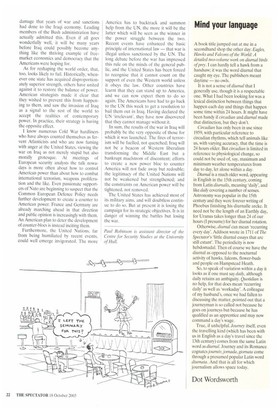Mind your language
A book title jumped out at me in a secondhand shop the other day: Eagles, Hawks and Falcons of the World: A detailed two-volume work on diurnal birds of prey. I can hardly tell a hawk from a handsaw; it was the word diurnal that caught my eye. The publishers meant daytime — no owls.
It is not a sense of diurnal that I generally use, though it is a respectable one. What I had been looking for was a lexical distinction between things that happen each day and things that happen some time within 24 hours. It might have been handy if circadian and diurnal made that distinction, but they don't.
Circadian has only been in use since 1959, with particular reference to circadian rhythms, which tell animals like us, with varying accuracy, that the time is 24 hours older. But circadian is limited in reference to physiological change, so could not be used of, say, maximum and minimum weather temperatures from day to day, let alone within a day.
Diurnal is a much older word, appearing in English in the 15th century, coming from Latin diumalis, meaning 'daily', and like daily covering a number of senses. Astronomy was popular in the 15th century and they were forever writing of Phoebus finishing his diurnalle arcke. It need not be the length of an Earthly day, for Uranus takes longer than 24 of our hours (I presume) for her diurnal rotation.
Otherwise, diurnal can mean 'recurring every day'. Addison wrote in 1711 of The Spectator's 'little diurnal essays that are still extant'. The periodicity is now hebdomadal. Then of course we have the diurnal as opposed to the nocturnal activity of hawks, falcons, flower-buds and people on Hampstead Heath.
So, to speak of variation within a day it looks as if one must say daily, although daily retains an ambiguity. Quotidian is no help, for that does mean 'recurring daily' as well as 'workaday'. A colleague of my husband's, once we had fallen to discussing the matter, pointed out that a journeyman is so called not because he goes on journeys but because he has qualified as an apprentice and may now command a day's wage.
True, if unhelpful. Journey itself, even the travelling kind (which has been with us in English as a day's travel since the 13th century) comes from the same Latin word as diurnal. Journey and its Romance cognates joumee,jornada,giornata come through a presumed popular Latin word diumata. And that is all for which journalism allows space today.
Dot Wordsworth


































































































 Previous page
Previous page